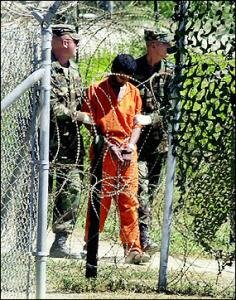|
By JOHN J. LUMPKIN, Associated Press Writer
 WASHINGTON - Most of the 594 U.S. prisoners at Guantanamo Bay, Cuba, appear willing to go before a tribunal that would give them a chance to convince military officers they have been wrongly detained, the Navy secretary said Friday. WASHINGTON - Most of the 594 U.S. prisoners at Guantanamo Bay, Cuba, appear willing to go before a tribunal that would give them a chance to convince military officers they have been wrongly detained, the Navy secretary said Friday.
Gordon England, who is overseeing the tribunal process at the Navy base, said the first hearings will begin late next week or early the following one. He offered no assessment of the prisoners' chances for release but said anyone found to be wrongly held would be returned to his home country.
The Guantanamo tribunals were set up soon after the Supreme Court ruled the prisoners there have a right to go to U.S. civilian courts to challenge their detention. The Pentagon said the purpose of the tribunals is to prepare for those court challenges by showing that a panel of military officers has reviewed each prisoner's case.
The prisoners, held with little or no contact with the outside for two years or more, were told of the Supreme Court's decision on their rights during the past several days. England, briefing reporters at the Pentagon, said most reacted positively and wanted to meet with the military officer who will serve as their personal representative during the tribunal.
"Most of the people who received this information listened, read and asked questions," England said. "And their most commonly asked questions were: `When can I meet with my personal representative? And when will the tribunal process begin?'"
Of the rest, he said, "About 5 percent of the people responded negatively. That is, crumpled up the notice and threw it on the floor, whatever."
Every prisoner's case will be reviewed, whether he wants to take part in the quasijudicial process or not. Those who participate can request affidavits from witnesses, including people overseas.
England said the prisoners also will be told their assigned personal representatives are not their advocates. He acknowledged any incriminating information a prisoner might provide to the representative, or to a translator, could be used in the tribunal.
"This isn't a trial," England said. "This is looking at facts."
He said he did not know whether any of the prisoners expressed interest in seeking freedom through the U.S. court system.
The tribunals will be open to the press, but England said the first ones probably would not be accessible. He blamed this on logistical difficulties of having reporters on the Navy base, rather than on any need for secrecy.
Organizations advocating for the rights of the prisoners at Guantanamo said the military-run tribunals would not offer the detainees a fair hearing.
"So we're told by the Department of Defense that prisoners, some held for two-and-a-half years, welcome a chance - any chance - to plead their case," said Alistair Hodgett, a spokesman for Amnesty International, in an e-mail. "That's hardly evidence that they - or anyone else - believes for a moment that the process is fair or just."
Also Friday, Supreme Court Justice John Paul Stevens granted a request from lawyers for some of the detainees named in the Supreme Court case to speed up paperwork needed before the June 28 ruling takes formal effect.
Ordinarily, the high court's rulings take effect 25 days after they are issued, in the form of an order to a lower court.
Lawyers for the detainees had argued that unless the Guantanamo ruling takes effect sooner, they could not be assured that they can get into the prison camp quickly to meet with their clients.
Stevens, author of the Supreme Court ruling, did not comment in granting the request.
Separately, the Pentagon announced Friday it was creating a new Office of Detainee Affairs to review reports from the International Committee of the Red Cross and bring worrisome ones to the attention of Defense Secretary Donald H. Rumsfeld.
Military officials have suggested that some Red Cross complaints about treatment of prisoners in Iraq, particularly at Abu Ghraib prison, did not reach high levels in the Defense Department quickly enough. The new office would attempt to change that.
Pentagon officials said the new detainee affairs office will fall under Douglas Feith, undersecretary of defense for policy. It will serve as the military's primary point of contact for the Red Cross, which monitors conditions of prisoners taken in an armed conflict, said Feith's principal deputy, Christopher "Ryan" Henry.
The person who will head the new office has not been named.
|